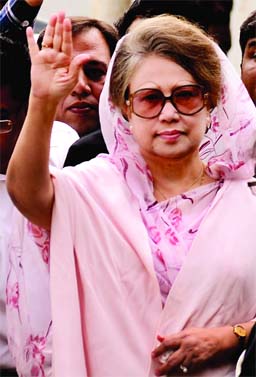
Staff Reporter :
BNP Chairperson Begum Khaleda Zia returned to her residence on Sunday, after 92 days stay in her Gulshan political office, following her bail in two graft cases.
After securing bail, the BNP chief went strait to her residence at Gulshan from the makeshift court and reached there around at noon. The Special Judge’s Court-3 was set up on the premises of Alia Madrasha in city’s Bakshibazar.
Earlier in the morning, Khaleda Zia appeared in the court and sought bail in Zia Orphanage Trust and Zia Charitable Trust graft cases. The court granted the bail to her and two other accused– former BNP MP Kazi Salimul Haque and businessman Sharfuddin Ahmed.
The BNP chief and the two other accused had been facing arrest warrant in the two cases. Judge of the Special Court Abu Ahmed Jomadar passed the order after Advocate Sanaullah Miah, a lawyer of the cases, submitted two separate bail petitions. Later, the court adjourned the hearing till May 5, in response to a time petition submitted by the defense.
While passing the order, the Judge said he has no wish to send Khaleda Zia to jail on her age ground and position. If she is found innocent, she will be acquitted, he added. The prosecution, however, did not oppose the bail.
During the hearing, the former prime minister was allowed to sit on a chair at the courtroom. The security around the court area was tightened earlier to avoid any untoward incident. Khaleda Zia’s car was attacked on December 24 last year when she went to the same makeshift court for a hearing.
The members of different law enforcement agencies, including police, RAB and BGB, were deployed on the court premises. A check post was also set up in front of the court’s main entrance.
On February 25, the court issued the arrest warrant revoking bail, as Khaleda Zia had skipped hearings on several occasions in the two cases.
The Anti-Corruption Commission filed both the cases accusing her of abusing power to collect money illegally for Zia Orphanage Trust and the Zia Charitable Trust during the BNP-led government’s tenure between 1991 and 1996.
Khaleda Zia had been staying at her Gulshan political office since January 3, as police put barricade on her way to join a planned rally in the city on January 5, the first anniversary of the 10th Parliamentary elections. The BNP-led 20-party alliance wanted to observe the day as ‘Democracy Killing Day’.
For the first time, the BNP chief came out of her Gulshan political office to appear in the court. She did not come out of the office for a single time in the last 92 days, even after the death of her younger son Arafat Rahman Koko, and on Amar Ekushey February and the Independence Day.
Khaleda Zia was barred from coming out of the office thrice by the police. She on January 5 announced the ongoing countrywide indefinite blockade programme after having failed to come out of the office.
The BNP chief was kept in ‘confinement’ at the office till January 19. Police withdrew their barricade from in front of Gulshan office on that day. Khaleda Zia held a press conference on the day and said she won’t leave the office, and would stay there to carry out party’s activities.
Meanwhile, party leaders and staff members, who had been staying with Khaleda Zia at the Gulshan office, also left the office. They include BNP standing committee member Nazrul Islam Khan, party vice chairman Selima Rahman, Khaleda Zia’s adviser Abdul Quayum, her press secretary Maruf Kamal Khan Sohel and special assistant Shimul Biswas.

